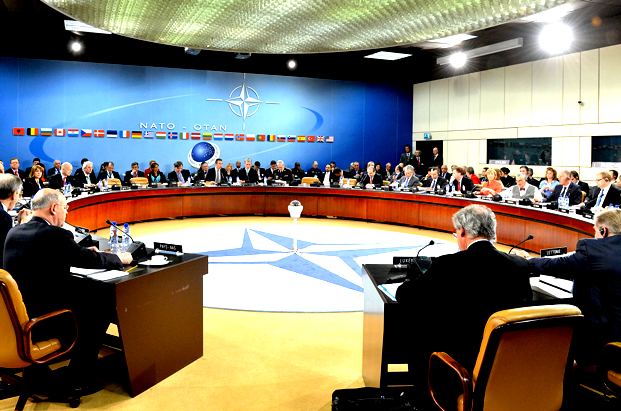NATO approves Patriot deployment, warns Syria avoid chemical weapons

By Sara Rajabova
The Turkish Foreign Ministry said on Tuesday that decision to deploy Patriot air-defense missiles in Turkey had affirmed solidarity and unity of Alliance, Anadolu agency reported.
Within the framework of ministerial meeting of NATO, held on Tuesday the North Atlantic Council has approved the deployment of the Patriot anti-missile batteries in Turkey.
"Within the framework of the Council decision, all Allies have voiced their grave concern regarding the situation along NATO's southeastern border, and declared their determination to deter threats towards, and to defend, our country. They have also reiterated their commitment to the security of NATO, and their full solidarity and resolve to protect the Allied populations and territories," the Turkish Foreign ministry said in a press release.
"Turkey welcomes this decision by NATO Foreign Ministers, which was taken as a consequence of the consultation process initiated by the North Atlantic Council meetings on June 26 and October 3 upon our request within the framework of Article IV of the North Atlantic Treaty. This decision is important, as it demonstrates and re-confirms Allied solidarity and unity in practical terms," the statement said.
The ministry said "the measures to be taken are in no way offensive. These measures are defensive and aim to augment our national air defense. These defensive measures have nothing to do with the establishment of a no-fly-zone."
"The locations in which these assets will be deployed are determined in light of the necessary military-technical analysis.
Turkey will continue the initiatives it has been undertaking with a view to solve the Syrian crisis through peaceful ways, with the same resolve as before," the ministry said.
NATO foreign ministers issued a statement after their decision to deploy Patriot air-defense systems in Turkey against possible attacks from Syria.
"In response to Turkey's request, NATO has decided to augment Turkey's air defence capabilities in order to defend the population and territory of Turkey and contribute to the de-escalation of the crisis along the Alliance's border. We have agreed to do so within the framework of the NATO integrated air defense system in order to preserve, protect and enhance the ability to defend the population and territory of Turkey in accordance with the NATO standing defense plan," the statement said.
It also said that North Atlantic Council has welcomed the intention of Germany, the Netherlands and the United States to provide Patriot missile batteries, subject to their respective national procedures and these systems will be under the operational command of the Supreme Allied Commander Europe (SACEUR).
They said any deployment will be defensive only and it will in no way support a no-fly zone or any offensive operation.
Russian Foreign Minister Sergei Lavrov said after talks with the NATO ministers that his country would not stand in the way, but also noted that "threats should not be overstated." He argued that Syrian attacks on Turkey had not been "intentional," DPA reported.
Moscow has repeatedly blocked US Security Council resolution condemning Syria, fearing a repeat of the NATO mission in Libya.
Both Turkish and NATO officials have insisted that the Patriot deployment will be defensive only and that they will not support a no-fly zone or any offensive operation.
However, the US Senate recommended that US President Barack Obama study the possibility of imposing the no-fly zone over Syria in an amendment approved on Wednesday, RIA Novosti reported.
The senators have voted 92-6 to require the Pentagon to report on options for using U.S. military assets to prevent Syrian President Bashar al-Assad from using air power against opposition forces.
"This amendment is simply a way of saying we in the Senate are concerned, care about the slaughter going on in Syria and agitated that those in the rest of the world are not doing more," Senator from Connecticut Joseph Lieberman said introducing the amendment.
The amendment gives Defense Secretary Leon Panetta 90 days after the enactment of the National Defense Authorization Act to report back to the House and Senate defense committees what options the US has to try to contain the Syrian conflict.
The US administration earlier said it opposed the move. The White House said, however, that it was ready to study all options for ending the Syrian conflict.
On the other hand, NATO warned the Syrian President Bashar al-Assad on Tuesday that any use of chemical weapons in the fight against rebel forces would be met by an immediate international response, Reuters reported.
The warning from NATO Secretary-General Anders Fogh Rasmussen came following the U.S. government sources said Washington had information that Syria was making what could be seen as preparations to use its chemical arsenal.
Earlier on Monday, the U.S. President Barack Obama issued a sharp warning to Syrian President Assad about any use of chemical weapons against the rebels fighting his regime.
"The possible use of chemical weapons would be completely unacceptable for the whole international community and if anybody resorts to these terrible weapons I would expect an immediate reaction from the international community," Rasmussen said.
He also added the chemical threat made it urgent for the alliance to send Patriot anti-missile missiles to Turkey.
The French Foreign Ministry referred to "possible movements on military bases storing chemical weapons in Syria" and said the international community would react if they were used.
The UK has told the Syrian government that any use of chemical weapons would have "serious consequences", Foreign Secretary William Hague said.
Here we are to serve you with news right now. It does not cost much, but worth your attention.
Choose to support open, independent, quality journalism and subscribe on a monthly basis.
By subscribing to our online newspaper, you can have full digital access to all news, analysis, and much more.
You can also follow AzerNEWS on Twitter @AzerNewsAz or Facebook @AzerNewsNewspaper
Thank you!
